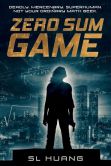Zero Sum Game, by SL Huang

I finished it two days later.
Here’s the official description:
Cas Russell is good at math. Scary good.
The vector calculus blazing through her head lets her smash through armed men twice her size and dodge every bullet in a gunfight. She can take any job for the right price and shoot anyone who gets in her way.
As far as she knows, she’s the only person around with a superpower … but then Cas discovers someone with a power even more dangerous than her own. Someone who can reach directly into people’s minds and twist their brains into Moebius strips. Someone intent on becoming the world’s puppet master.
Someone who’s already warped Cas’s thoughts once before, with her none the wiser.
Cas should run. Going up against a psychic with a god complex isn’t exactly a rational move, and saving the world from a power-hungry telepath isn’t her responsibility. But she isn’t about to let anyone get away with violating her brain — and besides, she’s got a small arsenal and some deadly mathematics on her side. There’s only one problem…
She doesn’t know which of her thoughts are her own anymore.
This is a fast-paced thriller with lots of action and fighting and a diverse cast and secret organizations and subterfuge and general sneakiness and ass-kicking. Cas is cold and efficient, but with just enough humanity to keep her somewhat sympathetic. Her two companions bookend her nature quite well: Rio is basically a serial killer channeling his violence toward the bad guys, while PI Arthur is the heart and morality of the group. The conflict between them is very well done, particularly Arthur’s horror when he realizes who Cas’ friend is.
I’m also quite fond of computer guru Chester, a wheelchair-using geek who reminds me of Oracle. (With the caveat that I haven’t read Oracle in the comics; I’m just familiar with her character from talking to my fellow geeks.)
The overall conflict is perhaps familiar, but still engaging: a group with mental superpowers is manipulating the world to make it better, even if that means brainwashing and killing those who get in the way. It presents some good ethical dilemmas, since the antagonists have set things up in such a way that hurting them could actually help other villains.
The one problem I kept stumbling over was Cas’ powers. I can buy that she’s a math supergenius, but instinctively seeing and understanding the math of the world around you is one thing. Being able to apply that math to put every bullet exactly where you want, to hit a kid with a tennis ball after three ricochets, to weave a motorcycle through traffic at insane speeds, these things kept snapping my suspension of disbelief. The physical aspect is a whole other superpowered skillset, one that’s never mentioned.
On the other hand, her superpower is math. How cool is that?
We do get hints about Cas’ backstory toward the end, but we’ll have to wait until at least book two for the details. Overall, the ending wasn’t as satisfying as I’d hoped, but again, I suspect that’s because Huang is setting the groundwork for future books.
Nitpicks aside, I devoured this book, and I’m very much looking forward to the sequel, Half Life, which should be out in January.






Ron Mitchell (@rnmitche)
November 5, 2014 @ 10:04 pm
Sounds like my kind of book. Just bought it.
Jim, the Amazon link goes to a different book.
Jim C. Hines
November 5, 2014 @ 10:06 pm
Dang it!
Fixed now, thank you.
Allison
November 6, 2014 @ 1:06 pm
I’ve often wondered about the theoretical-vs.-applied physics thing when it comes to Captain America’s shield. It’s like the opposite of your issue with Cas’ powers–Cap has the physical ability to throw his shield with pinpoint precision, but he must have killer spacial reasoning and math skills to get all the trajectories right and know the shield will bounce off certain points and come back. Nobody ever seems to mention this as part of his superpowers. Knowing the theory doesn’t always translate into physical ability, and vice versa, but it seems to in the world of superpowers.
Nenya
November 6, 2014 @ 7:51 pm
Math superpowers and mind control and a female action hero? Sign me up!
In physics and calculus classes in college I learned that we all actually have pretty good practical-calculus-computing powers in our heads: the ability to cross a street while a bicycle is coming and estimate how fast you’ll need to run in order to not be hit by the bike, for example, is something a 10 year old instinctively knows how to do long before they grow up to learn the math. So I can buy that someone with epic hardwired math skills could just be that much better at that kind of thing. (It still might break my suspension of disbelief depending how it’s done.)
Anyway sounds like a fun read–thanks for the rec!